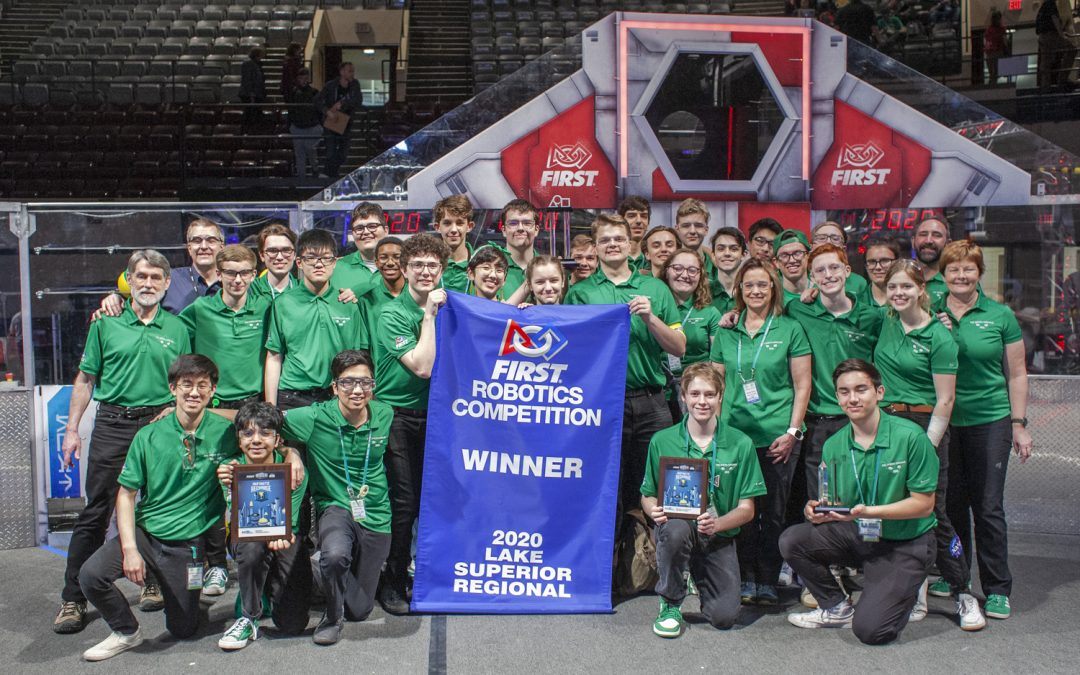Lake Superior Regional Alliance Captain and Event Winners, Entrepreneurship Award recipient, Contributor to COVID-19 PPE efforts
The Green Machine’s 15th season was incredibly successful, albeit shortened. At our first regional event, our robot lost only a single qualification match. We went on to win the Lake Superior Regional, Duluth, as the first alliance captain. We also received the Entrepreneurship Award for our comprehensive business plan and dedicated sponsor connections.
Our performance at the Duluth competition qualified our team –with 73 points– for the 9th annual MSHSL-FIRST State Robotics Championship, even though the May event was cancelled due to the COVID-19 pandemic. Our season came to an abrupt end on March 12, 2020, when FIRST cancelled the remaining competitions due to overriding concerns regarding health and safety. Not only did the cancellation mean we could not compete at the North Star Regional, Minneapolis, it also postponed our Team’s induction into the FIRST Hall of Fame. We earned that distinction in April, 2019, by winning the Detroit Championship Chairman’s Award for our years of consistent STEM outreach.
Before the shutdown, this year’s FIRST Robotics Competition game, Infinite Recharge, tasked teams with accurately and consistently shooting balls into high and low targets. The loading stations and targets were on opposite ends of the field, making it advantageous for teams to shoot from further distances. The game began with a short, 15-second, autonomous period where drivers couldn’t use their controls. After that, the game went into the 2:15 teleoperated period. In addition to the targets, teams could also score points with the color wheel. The color wheel had different tasks depending on the “stage”, which was based on completion of the previous stages and number of balls scored. At the end of the game, teams had to hang off a swinging bar. A ranking point was earned if the teams could balance the bar within a few degrees.
For Infinite Recharge, our robot “ Zodiac” was designed to shoot dodgeball-sized balls – called power cells – into hexagonal targets from up to 30 feet away. Robots also needed to collect power cells from either the floor or pickup station. To do so, Zodiac featured an over-the-bumper pickup mechanism that passed them directly into our “Spindexer” – a spinning chamber based on a Tippmann paintball gun. From there, the power cells were fed up to our flywheel-based turret, where they would be shot out. In order to reach the target from 30 feet, the power cells needed to be moving at 40+ mph; we used Falcon 500s (DC motor, motor controller, and encoder) for maximum efficiency. Utilizing a stereo camera to identify the target and determine distance, the turret automatically aimed and made precise shots. However, Zodiac didn’t stop there. For the first 15 seconds in the Infinite Recharge game, the drivers are not allowed to use their controllers. During this time, Zodiac moved autonomously using pre-built paths called “splines” and shot up to 7 power cells. This gave our team and our alliance a tremendous advantage at the start of every match.
Throughout the 2020 season, 1816 continued its STEM Advocacy work. We facilitated the annual Minnesota STEM Advocacy Day at our State Capitol, where we spoke with state legislators and demoed our robots in the Capitol rotunda. Although the FIRST National Advocacy Conference moved online via Zoom due to the pandemic, we participated in the Virtual FIRST National Advocacy Conference as event organizers and speakers.
The Green Machine also continued to develop our STEM for All program. In October 2019, we held our annual STEMToberfest at People Serving People, where we encourage and coach students in grades 3-7 to complete engineering and design tasks using LEGO Wedo kits. After this year’s program, we received an $1,800 grant to buy additional LEGO Wedo kits and tablets to expand this event in future years. In addition to our work with People Serving People, we continued our robot demos at events such as our sponsor Medtronic’s Women’s Networking Conference, Rockwell Collins, Seagate, PTC, and the Girls, Science, and Technology at the MN Science Museum. Outreach events included the 3rd annual SwampFest, co-organized with FRC Team 5172-Gators; seminars and workshops held at off-season scrimmages, as well as off-season training via JumpStart, held at Medtronic’s corporate headquarters.
This year, our season came to an abrupt and unprecedented end due to the COVID-19 pandemic. We could no longer work on robots, however, our team turned its efforts to assist with COVID-19 efforts. Personal Protective Equipment (PPE), in the form of 3D printed visors, to hold plastic face shields, and ear savers, flexible 3D printed elastic holders, became an immediate need. More than a half-dozen students, mentors, and volunteers on The Green Machine contributed 3D printed visors and ear savers, as well as donated time to help cut plastic shields as part of the efforts coordinated by FRC Team 2052-KnightKrawler.
The team also became heavy users of Zoom and other video conferencing software to continue all-team and subteam meetings. In April, students involved with robot fabrication, robot programming, game strategy, and scouting, conducted twice-weekly technical knowledge sharing sessions. We hope to resume more in-person sessions, and hope to be back competing in the 2020-2021 school year.

